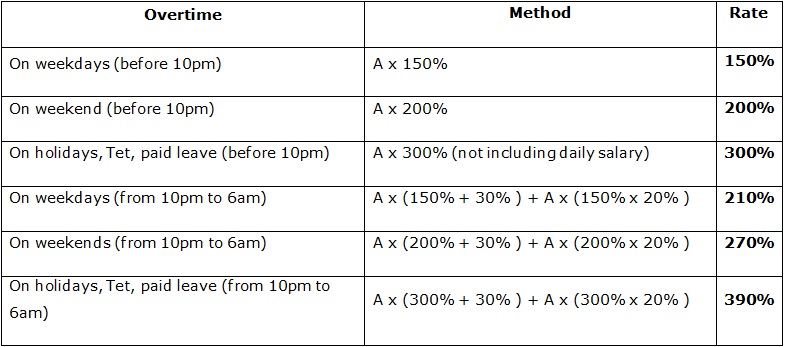Vietnam Labour Law Update (November 2014)

Dec 12, 2014
Last updated on Dec 15, 2023
On 05th November 2014, the Ministry of Labour - Invalids and Social Affairs (MOLISA) issued the official letter No. 4163 / LDTBXH-LÐTL (OL 4163) to answer Groz-Beckert Co.

I. GUIDELINES FOR CALCULATION OF SALARY FOR OVERTIME WORKING ON NIGHT SHIFT
On 05th November 2014, the Ministry of Labour – Invalids and Social Affairs (MOLISA) issued the official letter No. 4163 / LDTBXH-LÐTL (OL 4163) to answer Groz-Beckert Co. Vietnam’s question about the method for calculating salary for overtime working on night-shift during holidays, Tet and paid leave. The detailed guidelines per OL 4163 are as follows:
According to the provisions at point c of clause 1, clause 2 and 3 of Article 97 of the Labour Code:
1. An employee who works overtime will be paid according to the salary unit value or the salary based on the job duties, as follows:
c) On holidays or paid leave, an amount at least equal to 300%, not including the salary for the holiday and days-off for an employee entitled to daily salary.
2. An employee working at night shall be paid additionally at least 30% of the salary calculated by the salary unit value or the salary for the job when undertaken on a normal working day.
3. If an employee is working overtime on night-shift, in addition to the salary as prescribed in clause 1 and clause 2 of this Article, the employee shall also be paid an additional 20% of salary calculated by the salary unit value or the salary of work done in the day time.
Assuming the salary unit or the salary for the job undertaken on a normal working day of the employee is A, the allowance for overtime working on night-shift of holidays, Tet and paid leave will be paid at least:
300%A + 30%A + 20% x (300%A) = 390%A
Therefore, although there is no official letter proving guidelines for calculation of salary for overtime working at night-shift on weekdays and weekends, businesses can refer to the method below for these two remaining similar situations.
Working overtime on night-shift on weekdays will be paid at least:
150%A + 30%A + 20% x (150%A) = 210%A
Working overtime on night-shift at weekends will be paid at least:
200%A + 30%A + 20% x (200%A) = 270%A
The summary of salary for overtime working according to the new Law, interpreted from the above guidelines of MOLISA, is set out below:

II. INCREASE IN REGIONAL MINIMUM SALARY FROM 01st JANUARY 2015
On 11th November 2014, the Government issued Decree No. 103/2014/ND-CP (Decree 103) regulating the minimum regional salary of employees who works in businesses, co-operatives, farms, households, individuals and agencies, organizations that hire labor under labor contracts.
According to Decree 103, from 01st January 2015 the minimum regional salary applied to businesses operating in the regions will increase from 13,2% to 14,8% compared with the current level, as detailed below:

Decree 103 will take effect from 01st Jan 2015 and replace Decree No.182/2013/ND-CP
III. SOME NEW POINTS RELATED TO PERSONAL INCOME TAX (PIT) PER CIRCULAR 151/2014/TT-BTC
On 10th October 2014, the Ministry of Finance issued Circular No 151/2014/TT-BTC (Circular 151) providing implementation guidelines on Decree 91/2014/ND-CP issued by the Government on 01st October 2014 in relation to revision and supplementation of a number of Articles of Tax Decrees. Some new revisions and supplementation of Circular 151 are as follows:
– Revision and supplementary point dd.1, item dd, Clause 2, Article 2 of Circular No. 111/2013 / TT-BTC:
Housing benefits will be deducted from taxable income for PIT calculation purposes in the following instances:
- Where houses are built and provided free of charge to employees working in the industry by the employer;
- Where housing which has been built by employers in economic regions, or regions with difficult economic and social conditions, or regions with particularly difficult economic and social conditions, are provided free of charge to employees.
– Revision and supplementary point c, Clause 2, Article 26 of Circular No. 111/2013 / TT-BTC:
Individuals and households who have income from business and have paid PIT by the direct tax deduction method do not have to do PIT finalization for this income. Insurance agents, lottery agents and multi-level marketing agents for whom the income paying bodies have withheld PIT do not have to do PIT finalization for this income. (In the past, only individuals and households having only one income source from business and having paid PIT by the direct tax deduction method did not have to do PIT Finalization for such income.)
In cases where individuals have both income from business following the direct tax deduction method and income from salary, if they receive any income from business by the declaration method they will still have to summarize their income and do the PIT Finalization in accordance with regulations.
Circular 151 will take effect from 15th November 2014.

Solve your HR problems!
6th Floor, Star Building, 33 Mac Dinh Chi, Saigon Ward, Ho Chi Minh city, Vietnam

